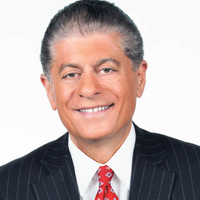Judge Andrew P. Napolitano
It gives me no joy to write about prosecuting former President Donald J. Trump.
He and I have been friends for nearly 40 years. We spoke many times during his presidency on a wide array of matters. Knowing him as I do and knowledgeable of the law and federal criminal procedure, I can state that he is his own worst enemy, and the feds -- of whom I am often highly critical -- had no choice but to indict him.
The indictment charges that he violated seven federal statutes, one of them 31 times. The essence of the indictment is his criminal retention of national defense information (NDI). This is not necessarily classified materials -- confidential, secret or top-secret -- as they can be declassified. But NDI is always and everywhere criminal to possess outside of a secure federal facility, and is always and everywhere secret because it shows military strengths and weaknesses and the methods and sources of reaching those conclusions.
The feds know this, and hence their indictment of him, as well as their search of his home, is grounded in NDI. This avoids litigation over his groundless, but I think sincerely held, claim that he can declassify documents merely by thinking them to be declassified.
Trump actually did the feds a favor when he took to the nation's airwaves upon learning that the FBI was searching his Florida home and claimed to have declassified the documents for which the FBI was looking.
He thereby violated Criminal Procedure 101 by denying an allegation before it was made. In doing so, of course, he admitted that he knew that he possessed the documents, an element -- knowledge -- that the feds can now prove using his own words.
His own words are cited extensively throughout the indictment, notably in his New Jersey home where he consented to a taped interview, and in a series of conversations with one of his attorneys, which he had every expectation would remain privileged.
In the taped conversation, he boasted that he had in his hands a document showing plans for a U.S. military invasion of Iran. He acknowledged that the contents of the document -- it is a paradigm of NDI -- are secret. Then he says, "As president, I could have declassified it. Now I can't, you know, but this is still a secret." He acknowledges his possession of NDI and that it contains secrets. When a staffer on the tape says, "Now we have a problem," Trump replies "Isn't that interesting." He was half-right. Military secrets -- NDI -- remain secret, whether declassified or not.
As a result of these admissions and after an examination of the seized documents, Trump has been charged with illegally retaining, withholding, concealing and scheming to conceal NDI. He has also been charged with conspiring to obstruct justice and causing false statements to be made to the government.
These are substantially similar charges to those filed against Daniel Ellsberg, Edward Snowden, Bradley Manning and Julian Assange. Yet, they acted out of selfless, principled fidelity to transparency in a democracy. Who knows why Trump kept all this secret stuff?
The false statements were actually made by his lawyers after he told them to tell the feds, whom he and the lawyers knew were looking for the documents, that he had already returned them. According to the lawyer to whom he made this statement and who instructed another lawyer to tell it to the feds, it was untrue. The statute that prohibits lying to the feds in an official communication also prohibits causing others to lie to them.
How do we know what he told his lawyers and what they told him? Aren't communications to and from one's lawyer protected by the attorney/client privilege? Generally, yes, unless the client uses the lawyer to effect a fraud or to commit a crime.
Here is the Attorney/Client Privilege 101. A client visits his attorney and recounts that he expects to be charged with bank robbery, and he asks the lawyer what defenses might be available. That conversation is privileged, meaning, at the client's option it can be kept secret.
On the other hand, if a client comes to his lawyer's office and says that he plans to rob a bank, and needs to know what defenses will be available to him, that conversation is not privileged, as the client plans to use the information he receives from the lawyer to commit a crime.
Keeping all this in mind, when the feds learned that Trump's lawyers had been untruthful when they told the feds that Trump no longer possessed the documents they were seeking, the feds subpoenaed Trump's lawyers and their notes of their communications with Trump. The lawyers moved to quash the subpoena, and a federal judge held a hearing on all this.
After hearing testimony, she ruled that when Trump told his lawyers that he no longer had the documents that the feds were demanding, and caused them to report this under oath to the feds, he was using them to deceive the FBI and commit perjury. Thus, she ruled there was no attorney/client privilege between Trump and these lawyers to whom he lied.
It gets worse. When one of those lawyers testified to the grand jury, he reported that Trump had asked him to take the documents from Trump's Florida home to the lawyer's hotel room and not return them. Of the 300+ documents Trump wrongfully took with him, the indictment only charges possession of 31, as he reluctantly returned all but 31. Had he returned all documents, as the law requires, we would not be having this conversation.
My Republican friends complain Trump should get special treatment because he is a former president and now running for president. But that defies due process, which teaches that no one is above the law's requirements or beneath its protections.
Photo by History in HD on Unsplash






You must be logged in to post stack comments. Please Login or Signup (free).